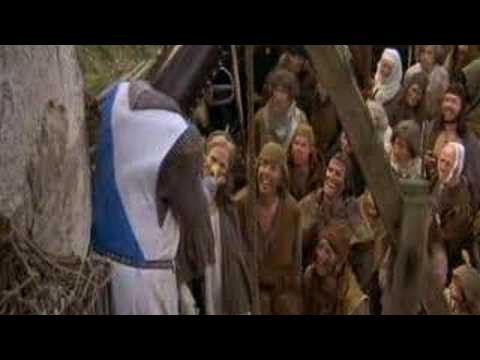It occurs to me: Most likely, neither Bedivere nor any of the villagers had ever seen a banana. If they had heard of one, probably all that they knew was that it was a fruit that grew in distant foreign places. And most of the fruit they were familiar with would have been roughly spherical, so they’d probably assume that the same was true of bananas. So it’s not so far-fetched that they’d think that the world was “banana-shaped”.
Well, if swallows bring coconuts, why can’t they bring bananas?
Not quite accurate. The various inquisitions were set up by the Papacy to hunt for heretics. (Except for the Spanish Inquisition, which was established by Ferdinand and Isabella of Spain; its mandate was to hunt for crypto-Jews and –Muslims among the conversos who were forced to convert to Catholicism.) There were some witch burnings in Catholic countries, but only later in the Middle Ages; originally, Catholic doctrine held belief in witchcraft to be a pagan heresy. This shifted, perhaps significantly, around the time of the Reformation. There never was an Inquisition established in England or Scotland.
Witch-burnings were far more common in the Protestant countries of northern Europe: Denmark, England, Scotland, and especially Germany. In the 16th and 17th centuries, some notable trials and executions took place in Catholic countries like Poland, Bohemia, and Austria, but they were mostly conducted by secular authorities. (One exception being the Northern Moravia witch trials, which were spearheaded by a Jesuit priest and took place in the context of suppression of Protestantism in Bohemia.)
It’s a question of weight ratios!
It may be a case of my appreciation of comedy being colored by my own experience and background, but I assumed the the members of Monty Python knew, as I do, that there were no such things as witches. Therefore, I took the point of that scene as making fun of both the idea of belief in witchcraft, and medieval scholasticism.
As has been noted up thread, there was a lot of commentary about class in the movie, so that also figures in. Sir Belvedere was a classically educated gentleman, and every bit as much an idiot as the uneducated peasants who just wanted to burn a “witch.”
I always thought the best part of that movie was the ending, when the police show and arrest the lot of them.
There are some who call me . . . Tim.
This is because for Catholics, living strictly by the bible was not as important as doing what the church authorities told you to do-- most medieval Christians had never held a bible, let alone read one.
But a doctrine of Lutheranism is “Sola Scriptura.” The authority of the bible superseded the authority of the church’s governing authorities.
There’s a line in the bible that pretty clearly says “Don’t permit a witch to live.” So Protestants went on witchhunts.
I never assumed she was a witch, either. I would expect that, if she were, she’d, you know, act like a witch and use her magic. So I interpreted her statement as mockery.
I am actually surprised that “it’s a fair cop” is a Britishism some people didn’t know. I guess, if I think about it, it is British in origin, but it just is in my head as a normal thing people might say–at least, on TV and in stories.
in this clip, at 3:40-45 you can see, barely, that the bird is still on the scale.
“It’s a fair cop” isn’t widely known?
Interested people may wish to read the Catholic Education Resource Centre “Catholics and Protestants hunted witches with comparable vigor.” and " Jacob Sprenger and Heinrich Kraemer, were experienced Dominican inquisitors who had burned 48 witches in one diocese alone and had obtained a papal bull approving their mission."
Also, although there was no inquisition in England, there were visits from appointed (international) inquisitors.
FWIW, I’ve always thought that the amazing thing about parochial teaching was not that they could defend the inquisition, but that they wanted to do so. (I don’t regard our ancestors as stupider than us)
Suppose two swallows carried it together?
For a long time I couldn’t make out what she said, and assumed it was a sarcastic rejoinder about the idiot logic. Knowing what it is that she said doesn’t make me feel any different.
Of course she was a witch. And I am familiar with “It’s a fair cop,” but only because I’ve read and watched so much British stuff. It’s the same as saying, “All right, all right, ya got me fair and square.”
